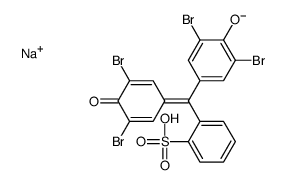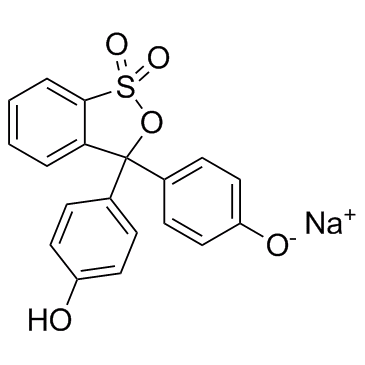62625-28-9
| 中文名 | 溴酚蓝钠盐 |
|---|---|
| 英文名 | Bromophenol Blue sodium salt |
| 中文别名 | 溴酚蓝,钠盐 |
| 英文别名 |
sodium,2-[(3,5-dibromo-4-hydroxyphenyl)-(3,5-dibromo-4-oxocyclohexa-2,5-dien-1-ylidene)methyl]benzenesulfonate
EINECS 204-086-2 MFCD00013793 |
| 描述 | 溴酚蓝钠是一种pH指示剂。它从pH 3.0时的黄色变为pH 4.6时的蓝色。溴酚蓝钠也被用作跟踪染料,用于监测琼脂糖凝胶电泳和聚丙烯酰胺凝胶电泳的过程[1][2]。 |
|---|---|
| 相关类别 | |
| 参考文献 |
| 密度 | 0.954 g/mL at 20ºC |
|---|---|
| 熔点 | >300ºC |
| 分子式 | C19H9Br4NaO5S |
| 分子量 | 691.94300 |
| 精确质量 | 687.68000 |
| PSA | 102.88000 |
| LogP | 7.62510 |
| 外观性状 | 蓝色 |
| 储存条件 | 存放在密封容器内,并放在阴凉,干燥处。 |
| 稳定性 | 常温常压下稳定,远离氧化剂。 |
| 水溶解性 | soluble |
| 分子结构 | 1、 摩尔折射率:123.26 2、 摩尔体积(m3/mol):304.5 3、 等张比容(90.2K):893.7 4、 表面张力(dyne/cm):74.1 5、 极化率(10-24cm3):48.86 |
| 计算化学 | 1.疏水参数计算参考值(XlogP):无 2.氢键供体数量:1 3.氢键受体数量:5 4.可旋转化学键数量:3 5.互变异构体数量:3 6.拓扑分子极性表面积103 7.重原子数量:30 8.表面电荷:0 9.复杂度:844 10.同位素原子数量:0 11.确定原子立构中心数量:0 12.不确定原子立构中心数量:0 13.确定化学键立构中心数量:0 14.不确定化学键立构中心数量:0 15.共价键单元数量:2 |
| 更多 | 1. 性状:无色或浅红色结晶。 2. 密度(g/mL,25/4℃):0.954 3. 相对蒸汽密度(g/mL,空气=1):未确定 4. 熔点(ºC):未确定 5. 沸点(ºC,常压):未确定 6. 沸点(ºC,5.2kPa):未确定 7. 折射率:未确定 8. 闪点(ºC): 未确定 9. 比旋光度(º):未确定 10. 自燃点或引燃温度(ºC):未确定 11. 蒸气压(kPa,25ºC):未确定 12. 饱和蒸气压(kPa,60ºC):未确定 13. 燃烧热(KJ/mol):未确定 14. 临界温度(ºC):未确定 15. 临界压力(KPa):未确定 16. 油水(辛醇/水)分配系数的对数值:未确定 17. 爆炸上限(%,V/V):未确定 18. 爆炸下限(%,V/V):未确定 19. 溶解性:溶于水,溶液呈蓝色。 |
Synonym:4,4'-(3h-1,2 benzoxathiol-3-ylidene)bis(2,6-dibromophenol s,s-dioxide monosodium sal Section 2 - COMPOSITION, INFORMATION ON INGREDIENTS
Risk Phrases: None Listed. Section 3 - HAZARDS IDENTIFICATION EMERGENCY OVERVIEW
The toxicological properties of this material have not been fully investigated. Potential Health Effects Eye: May cause eye irritation. This product contains an anionic dye. Similar dyes have not caused injury to the cornea or conjunctiva in documented exposure cases with human or rabbit eyes. Skin: May cause skin irritation. Ingestion: May cause gastrointestinal irritation with nausea, vomiting and diarrhea. The toxicological properties of this substance have not been fully investigated. Inhalation: May cause respiratory tract irritation. The toxicological properties of this substance have not been fully investigated. Chronic: No information found. Section 4 - FIRST AID MEASURES Eyes: Flush eyes with plenty of water for at least 15 minutes, occasionally lifting the upper and lower eyelids. Get medical aid. Skin: Get medical aid. Flush skin with plenty of water for at least 15 minutes while removing contaminated clothing and shoes. Wash clothing before reuse. Ingestion: Get medical aid. Do NOT induce vomiting. If conscious and alert, rinse mouth and drink 2-4 cupfuls of milk or water. Inhalation: Remove from exposure and move to fresh air immediately. If not breathing, give artificial respiration. If breathing is difficult, give oxygen. Get medical aid if cough or other symptoms appear. Notes to Physician: Section 5 - FIRE FIGHTING MEASURES General Information: As in any fire, wear a self-contained breathing apparatus in pressure-demand, MSHA/NIOSH (approved or equivalent), and full protective gear. During a fire, irritating and highly toxic gases may be generated by thermal decomposition or combustion. Extinguishing Media: Use agent most appropriate to extinguish fire. Use water spray, dry chemical, carbon dioxide, or appropriate foam. Section 6 - ACCIDENTAL RELEASE MEASURES General Information: Use proper personal protective equipment as indicated in Section 8. Spills/Leaks: Vacuum or sweep up material and place into a suitable disposal container. Clean up spills immediately, observing precautions in the Protective Equipment section. Avoid generating dusty conditions. Provide ventilation. Section 7 - HANDLING and STORAGE Handling: Wash thoroughly after handling. Use with adequate ventilation. Minimize dust generation and accumulation. Avoid contact with eyes, skin, and clothing. Keep container tightly closed. Avoid ingestion and inhalation. Storage: Store in a tightly closed container. Store in a cool, dry, well-ventilated area away from incompatible substances. Section 8 - EXPOSURE CONTROLS, PERSONAL PROTECTION Engineering Controls: Facilities storing or utilizing this material should be equipped with an eyewash facility and a safety shower. Use adequate ventilation to keep airborne concentrations low. Exposure Limits CAS# 62625-28-9: Personal Protective Equipment Eyes: Wear appropriate protective eyeglasses or chemical safety goggles as described by OSHA's eye and face protection regulations in 29 CFR 1910.133 or European Standard EN166. Skin: Wear appropriate protective gloves to prevent skin exposure. Clothing: Wear appropriate protective clothing to prevent skin exposure. Respirators: A respiratory protection program that meets OSHA's 29 CFR 1910.134 and ANSI Z88.2 requirements or European Standard EN 149 must be followed whenever workplace conditions warrant respirator use. Section 9 - PHYSICAL AND CHEMICAL PROPERTIES Physical State: Solid Color: Not available. Odor: none reported pH: Not available. Vapor Pressure: Not applicable. Viscosity: Not available. Boiling Point: Not available. Freezing/Melting Point: Not available. Autoignition Temperature: Not applicable. Flash Point: Not applicable. Explosion Limits, lower: Not available. Explosion Limits, upper: Not available. Decomposition Temperature: Solubility in water: Specific Gravity/Density: Molecular Formula: C19H9Br4NaO5S Molecular Weight: 691.95 Section 10 - STABILITY AND REACTIVITY Chemical Stability: Stable under normal temperatures and pressures. Conditions to Avoid: Incompatible materials, dust generation, excess heat. Incompatibilities with Other Materials: Oxidizing agents. Hazardous Decomposition Products: Carbon monoxide, oxides of sulfur, irritating and toxic fumes and gases, carbon dioxide, hydrogen bromide. Hazardous Polymerization: Has not been reported. Section 11 - TOXICOLOGICAL INFORMATION RTECS#: CAS# 62625-28-9 unlisted. LD50/LC50: Not available. Carcinogenicity: Bromophenol blue, sodium salt - Not listed by ACGIH, IARC, or NTP. Section 12 - ECOLOGICAL INFORMATION Section 13 - DISPOSAL CONSIDERATIONS Dispose of in a manner consistent with federal, state, and local regulations. Section 14 - TRANSPORT INFORMATION IATA Not regulated as a hazardous material. IMO Not regulated as a hazardous material. RID/ADR Not regulated as a hazardous material. Section 15 - REGULATORY INFORMATION European/International Regulations European Labeling in Accordance with EC Directives Hazard Symbols: Not available. Risk Phrases: Safety Phrases: WGK (Water Danger/Protection) CAS# 62625-28-9: No information available. Canada CAS# 62625-28-9 is listed on Canada's DSL List. CAS# 62625-28-9 is not listed on Canada's Ingredient Disclosure List. US FEDERAL TSCA CAS# 62625-28-9 is listed on the TSCA inventory. SECTION 16 - ADDITIONAL INFORMATION N/A |
|
生态学数据: 通常对水是不危害的,若无政府许可,勿将材料排入周围环境。
|
| 危害码 (欧洲) | Xi: Irritant; |
|---|---|
| 风险声明 (欧洲) | R36/37/38 |
| 安全声明 (欧洲) | S26-S37/39 |
| 危险品运输编码 | UN 2265 3 |
| WGK德国 | 3 |
| RTECS号 | SJ7453000 |
|
~% 
62625-28-9 |
| 文献:Angewandte Chemie - International Edition, , vol. 52, # 35 p. 9238 - 9241 Angew. Chem., , vol. 125, # 35 p. 49408 - 49411 |
| 上游产品 1 | |
|---|---|
| 下游产品 0 | |


